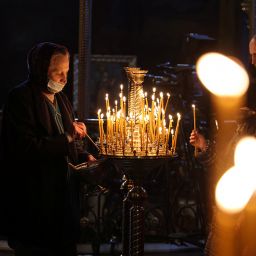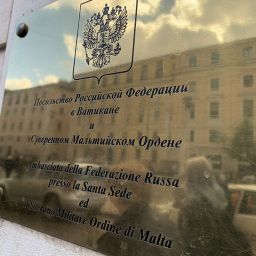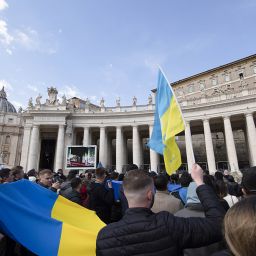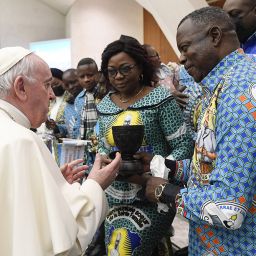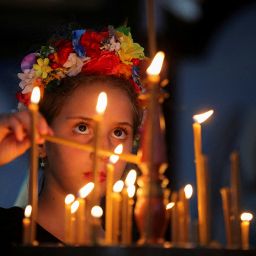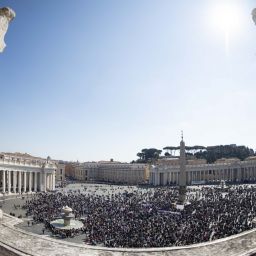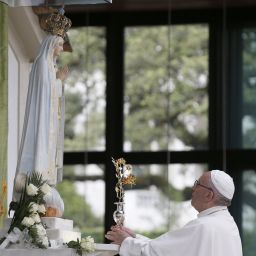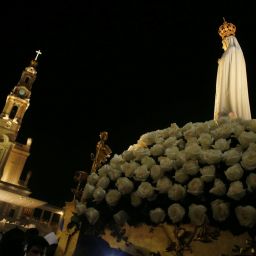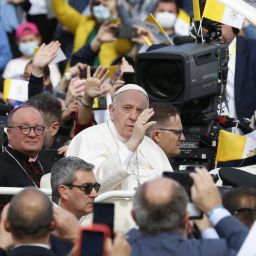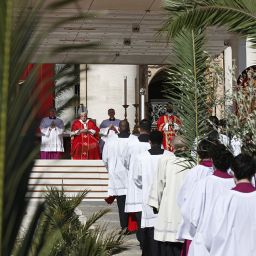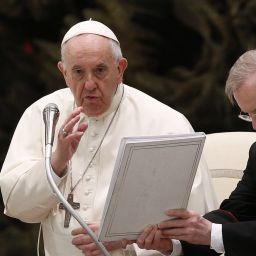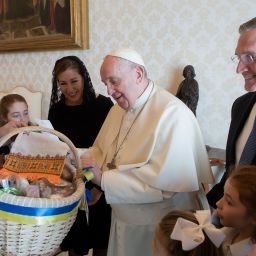
By Justin McLellan
Catholic News Service
VATICAN CITY — Pope Francis appointed his longtime theological adviser and fellow countryman Archbishop Víctor Manuel Fernández of La Plata, Argentina, to lead the Vatican’s doctrinal office, urging him in a public letter to expand the office’s focus beyond its reputation as a watchdog pursuing possible doctrinal errors and to promote the understanding and transmission of the faith.
Archbishop Fernández, who turns 61 July 18, replaces Jesuit Cardinal Luis Ladaria, 79, according to the Vatican, which made the announcement July 1. It said the cardinal had completed his term as prefect of the Dicastery for the Doctrine of the Faith, which began with his appointment July 1, 2017. Archbishop Fernández will begin his new role mid-September, which also includes serving as president of the Pontifical Biblical Commission and president of the International Theological Commission.
In an open letter to the archbishop, the pope asked him to lead the dicastery toward promoting theology that is attentive to the essentials of the faith and at the service of evangelization. “Its central purpose is to guard the teaching that flows from the faith in order to ‘to give reasons for our hope, but not as an enemy who critiques and condemns.'”
“The dicastery which you will preside over in other times came to use immoral methods. Those were times when, rather than promoting theological knowledge, possible doctrinal errors were pursued,” the pope wrote. “What I expect from you is certainly something very different.”
In his letter Pope Francis recalled the restructuring of the dicastery in 2022 which split the office into two sections: one to handle doctrinal questions and another dedicated to handling disciplinary matters including those related to the abuse of minors.
Given that the specific section for disciplinary matters is staffed “with very competent professionals, I ask you as prefect to dedicate your personal commitment in the most direct way to the principal aim of the dicastery which is keeping the faith,” he wrote.
The pope wrote that task consists of “increasing the understanding and transmission” of the Catholic faith, especially before questions “posed by the progress of the sciences and the development of society.”
“These issues, incorporated in a renewed proclamation of the Gospel message, ‘become tools of evangelization'” because they allow the faith to enter into conversation with “our present situation, which is in many ways unprecedented in the history of humanity,” he wrote.
The church, Pope Francis wrote, must “grow in her interpretation of the revealed word and in her understanding of truth.”
“For differing currents of thought in philosophy, theology and pastoral practice, if open to being reconciled by the Spirit in respect and love, can enable the church to grow,” he said. “This harmonious growth will preserve Christian doctrine more effectively than any control mechanism.”
In a Facebook post July 1, Archbishop Fernández said he accepted the nomination “with much joy” even though there would be many people against him. “There are people who prefer a more rigid, structured way of thinking at war with the world,” he wrote.
The pope told him that while the dicastery was once dedicated to pursuing heretics in the past, he wanted something very different for its future since “errors are not corrected by going after them or controlling them, but by making faith and wisdom grow. This is the best way to preserve doctrine,” the archbishop wrote.
He added that Pope Francis assured him that matters related to abuse pertained to an autonomous section within the dicastery, and that as prefect he would be tasked with “encouraging the reflection of the faith, deepening theology, promoting a way of thinking that knows how to dialogue with how people live,” and “encouraging free, creative, deep Christian thought.”
As archbishop of Buenos Aires, Cardinal Jorge Bergoglio nominated then-Father Fernández to become rector of the Pontifical Catholic University of Argentina in 2009. The two have long enjoyed a close relationship, and Pope Francis promptly named him an archbishop after his election to the papacy in 2013.
Archbishop Fernández studied theology with a specialization in biblical studies at Rome’s Pontifical Gregorian University and obtained a doctorate from the Pontifical Catholic University of Argentina. Since 2017 he has been the president of the doctrine commission of Argentina’s bishops’ conference. Between books and academic articles, he has more than 300 publications under his name.
At the Vatican, the archbishop was a member of the drafting committees for the final documents of the 2014 and 2015 Synods of Bishops and he has been credited for contributing to several significant texts of Pope Francis’ pontificate.
In his letter Pope Francis said that the church needs “a way of thinking which can convincingly present a God who loves, who forgives, who saves, who liberates, who promotes people and calls them to fraternal service.”
This occurs, the pope said, if “the message concentrates on the essentials, on what is most beautiful, most grand, most appealing and at the same time most necessary.”
“There is a harmonious order among the truths of our message and the greatest danger occurs when secondary issues end up overshadowing the central ones,” he wrote.
Such a richness of truth necessitates “a special care to verify that the documents of your own dicastery and of the others have an adequate theological support, are coherent with the rich soil of the perennial teaching of the church and at the same time take into account the recent magisterium,” Pope Francis told him.


